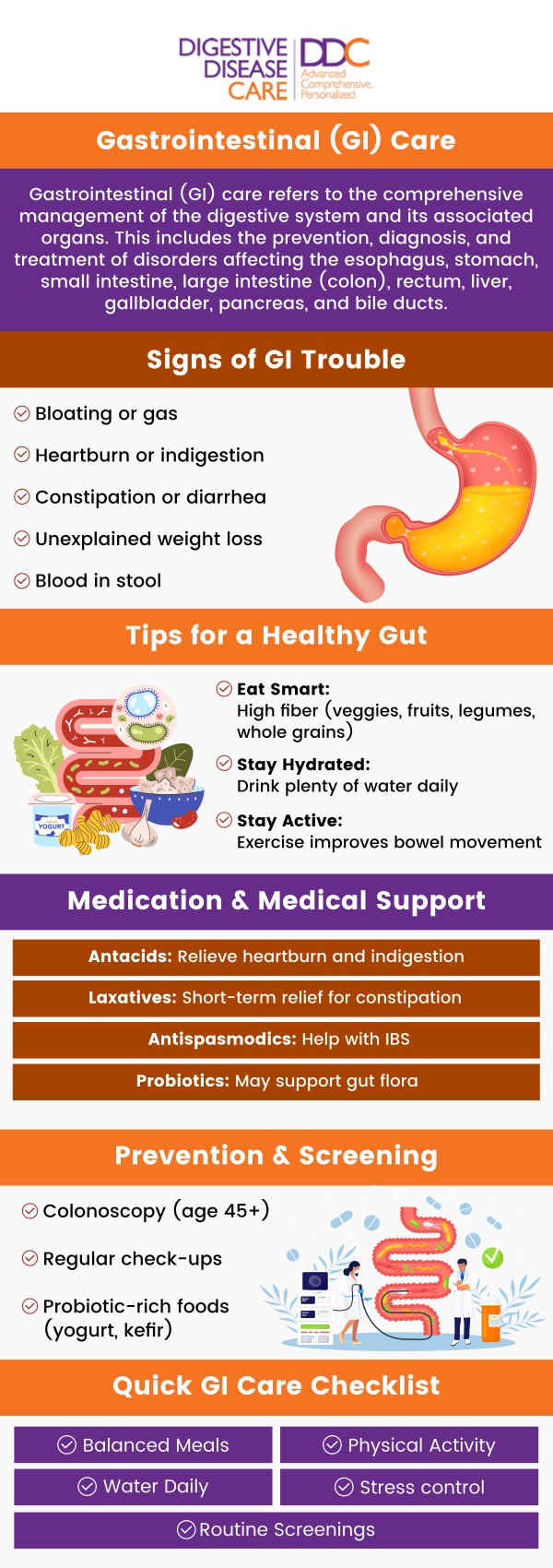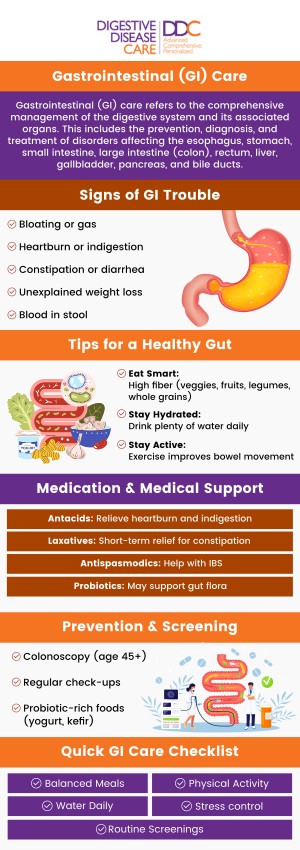Understanding Your GI Tract Q&A
The gastrointestinal tract (GI tract) is a vital part of the digestive system and includes the stomach and intestines. Issues with the gastrointestinal tract can result in stomach pain, indigestion, and irregular bowel movements. If you are experiencing symptoms related to gastrointestinal tract issues, you should be evaluated by a medical professional right away. Visit Digestive Disease Care (DDC) for the treatment of digestive system disorders by board-certified gastroenterologists. For more information, please contact us or request an appointment online. We have convenient locations to serve you in Babylon NY, East Setauket NY, Forest Hills NY, Jericho NY, Lake Success NY, Melville NY, Mineola NY, Massapequa NY, New Hyde Park NY and Riverhead NY.




Table of Contents:
What does the GI tract consist of?
What are GI tract problems?
What are the most common signs and symptoms of gastrointestinal disorders?
How do you treat gastrointestinal issues?
The gastrointestinal tract consists of a long network of muscular tubes starting from where food enters the mouth in the oral cavity, continuing through the pharynx, esophagus, stomach, and intestines to where food is expelled in the rectum and anus. By secreting enzymes to help break down food into its component nutrients, there are various accessory organs that assist the tract. These include the salivary glands, pancreas, gall bladder, and liver. Peristaltic movements of the muscular walls propel food along the length of the GIT.
Breaking down food into nutrients is the primary purpose of the gastrointestinal tract, which is absorbed into the body to provide energy. First, food must be ingested into the mouth to be moistened and masticated (chewed). Secondly, digestion primarily occurs in the stomach and small intestine. This is where carbohydrates, proteins, and fats are broken down into their basic chemical structures. Smaller molecules are then absorbed in the small intestine which subsequently enters the circulatory system. The large intestine plays a crucial role in the reabsorption of excess water. Finally, undigested material and secreted waste products are excreted from the body via defecation (passing of feces).
There are a wide number of different conditions or diseases that affect the GI tract. These can have a significant impact on digestion and our overall health. Common gastrointestinal disorders include:
• Celiac disease
• Constipation
• Crohn’s disease
• Diarrhea
• Diverticular disease
• Gastroesophageal Reflux Disease (GERD)
• Hemorrhoids and anal fissures
• Irritable Bowel Syndrome (IBS)
• Lactose intolerance
• Malabsorption syndromes
• Polyps and colorectal cancer
• Peptic Ulcer Disease (PUD)
• Ulcerative colitis
• Vomiting
Symptoms of digestive disorders vary greatly from person to person and each condition affects everyone differently. However, common symptoms of gastrointestinal problems include:
• Abdominal discomfort (bloating, pain or cramps)
• Unintentional weight loss
• Vomiting and nausea
• Acid reflux (heartburn)
• Diarrhea, constipation (or sometimes both)
• Fecal incontinence
• Fatigue
• Loss of appetite
• Difficulty swallowing
If you see blood in your vomit or stool, get in touch with your physician immediately.
In most cases of gastrointestinal issues, self-care measures are the recommended treatment. Antibiotics will have no effect on GI infections caused by viruses or parasites.
In complicated cases of bacterial infection, antibiotics can help. However, in uncomplicated cases of a bacterial infection, antibiotics may prolong the condition and increase the risk of relapse by weakening the effectiveness of the antibiotics. Additionally, antibiotics may lead to dangerous complications in certain infections. Your doctor can help determine if antibiotics are right for you.
As high-fiber foods can make diarrhea worse, you may be recommended to avoid them. To neutralize stomach acid or to treat nausea, abdominal pain, and diarrhea, over-the-counter medications may also be recommended. Staying hydrated is the most important self-care treatment for people with a GI infection.
If you or someone you know is experiencing problems with their gastrointestinal tract, come to Digestive Disease Care (DDC) for treatment today. Our kind and compassionate professionals are experienced in treating gastrointestinal tract issues and can help you get on the road to recovery. For more information on GI tract treatments, call our office and get in touch with a member of our specialist team. To book an appointment with a gastroenterologist, visit our website or speak with us over the phone today. We have convenient locations to serve you in Melville NY, New Hyde Park NY, Forest Hills NY, Jericho NY, Mineola NY, Lake Success NY, Babylon NY, East Setauket NY, Massapequa NY, Riverhead NY and BEYOND.

Check Out Our 5 Star Reviews


Additional Services You May Like

Additional Services You May Like
- Abdominal Pain
- Acid Reflux
- Barretts Esophagus
- Bloating
- Capsule Endoscopy
- Celiac Disease
- Colon Cancer Screening
- Colonoscopy
- Constipation
- Crohns Disease
- Diarrhea
- Diverticulitis
- Esophageal PH Monitoring
- Fatty Liver
- Fibroscan
- Gallstones
- Gastroenterologist
- Gastric Chest Pain
- Gluten Intolerance
- Hemorrhoid
- Hemorrhoid Banding
- Hepatitis
- Irritable Bowel Syndrome
- Lactose Intolerance
- Pancreatitis
- Polyps
- Rectal Bleeding
- Stomach
- Ulcerative Colitis
- GI Urgent Care





